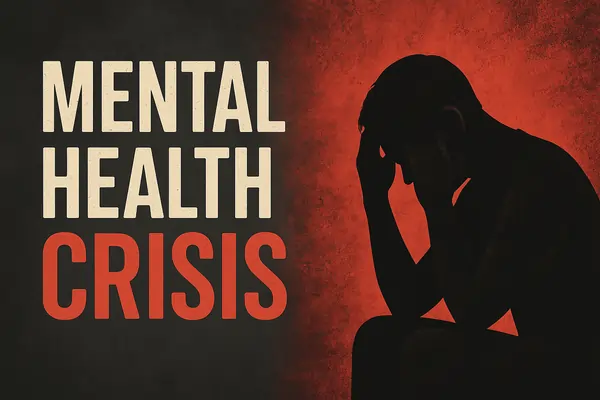
Mental Health Crisis in Filipino Youth | Rising Teen Struggles
Every day, Filipino teens carry emotional burdens they struggle to express. Academic pressure, social media expectations, and limited support systems overwhelm many. These silent battles now drive a national mental health crisis that calls for more than awareness—it demands collective action.
Academic Pressure Weighs Heavily
Students spend long hours tackling demanding schoolwork. Many push themselves out of fear of failing their families. They sacrifice rest and emotional balance just to keep up. As pressure builds, their mental well-being suffers.
Social Media’s Hidden Impact
Rather than build connection, social media often sparks insecurity. Teens constantly compare their lives to edited images and viral posts. Online bullying and the need for validation through likes and shares worsen emotional struggles. These effects quietly damage their self-esteem.
Home Doesn’t Always Feel Safe
Many teens avoid expressing emotions at home. Some parents dismiss their feelings as drama or weakness. As a result, teens stay silent. Without role models for healthy emotional expression, they keep their pain inside.
Schools Offer Limited Mental Health Support
Across the country, schools struggle to meet students’ emotional needs. Few campuses have licensed counselors. Mental health education is rarely part of the curriculum. Students fear judgment, so they hide their struggles instead of seeking help.
How We Can Help Teens Thrive
We can address the crisis—if we act now.
- Start open conversations in schools and homes
- Train teachers and parents to recognize signs of distress
- Assign professional counselors to every school
“When teens feel safe to speak, they begin to heal. But ignored silence grows louder—and more painful.”
Understanding the Crisis: Why Teen Mental Health Is Deteriorating
In many communities, teens quietly shoulder invisible emotional weight. Pressured by school, family, and peers, they rarely get space to process their experiences. Most don’t receive guidance on managing stress, emotions, or self-worth.
When they try to speak up, others often misunderstand or ignore them. This repeated invalidation causes emotional wounds that deepen over time.
“Teens can’t grow emotionally when forced into silence. Safe spaces don’t just help—they protect.”
What’s Fueling the Crisis
These five forces drive the mental health crisis deeper into teen lives:
1. Unrelenting Academic Pressure
School feels like a battlefield. Teens face long hours, repetitive exams, and fierce competition. Instead of rest, they get stress.
2. Silence at Home
Many families avoid emotional conversations. Teens fear judgment or being labeled dramatic, so they keep their feelings hidden.
3. Deep and Lasting Effects of Bullying
Whether in person or online, bullying leaves emotional scars. Insults, exclusion, and threats damage self-worth—and adults often fail to intervene.
4. Fear of Being Judged
The fear of ridicule stops teens from opening up. Instead, they pretend to be okay, even when they’re not.
5. Lack of Mental Health Staff in Schools
Students often want to talk—but no one listens. Most schools lack mental health professionals or structured wellness programs.
“Pretending to be fine isn’t strength—it’s survival.”
Real Stories from the Classroom
Behind quiet smiles, many teens suffer. One Grade 10 student in Manila shared:
“I always feel overwhelmed, but I don’t know who to talk to. I’m scared they’ll say I’m being dramatic.”
This fear silences students across the country. In rural areas, the problem worsens. A teacher from Cebu explained:
“Some students cry in the restroom or skip class for days due to anxiety. But when we inform parents, many dismiss it as laziness.”
These stories prove that emotional pain exists—even when no one sees it.
Digital Pressure Makes It Worse
Social media adds another layer of stress. One 15-year-old in Quezon City said:
“If no one reacts to my post, I feel like I don’t matter.”
Teens measure their worth through likes and views. They constantly compare themselves to flawless images. Meanwhile, cyberbullying and excessive screen time quietly damage mental health.
“It’s no longer just social media—it’s a mirror that distorts how teens see themselves.”
The Gaps in Mental Health Support
While awareness has grown, actual support still lags behind.
❌ Few Schools Have Licensed Mental Health Staff
Many rely on guidance counselors untrained in clinical care.
❌ Mental Health Isn’t Taught in Classrooms
Teens rarely learn about emotional regulation or stress management.
❌ Therapy Still Carries a Stigma
Families often view counseling as unnecessary or shameful.
❌ Rural Teens Lack Access
Outside urban areas, students struggle to find mental health resources.
“We talk about mental health—but too few actually offer help.”
Real Solutions That Can Save Lives
This crisis isn’t permanent. These small, strong actions can make a difference:
✅ Hire More Counselors and Train School Staff
Every student deserves access to trained emotional support.
✅ Include Mental Health Topics in Classes
Teaching coping skills helps students navigate stress early.
✅ Encourage Open Family Conversations
Teens need homes where they feel heard and respected.
✅ Launch Accessible Helplines for Youth
Confidential support can offer a lifeline to those in crisis.
✅ Create Peer Support Programs in Schools
Teens often connect best with peers who understand their struggles.
“Support doesn’t need to be perfect—it needs to be present.”
Call to Action: A Shared Responsibility
We all play a role in solving this crisis. Parents, educators, health professionals, and leaders must unite to build a future where mental health matters just as much as academic success.
Let’s give Filipino teens:
- Safe places to talk
- Adults who listen
- A culture that values emotional well-being
“Support starts with listening. Healing begins when someone truly understands.”
Frequently Asked Questions (FAQs)
What are signs of mental health issues in teens?
Watch for mood swings, changes in sleep, loss of interest in activities, social withdrawal, or unexplained fatigue. Early detection is crucial.
Can schools support teen mental health?
Yes. Schools with trained counselors, wellness programs, and inclusive policies can create safe spaces and promote emotional resilience.
Is therapy accessible in the Philippines?
Therapy exists but is often limited by cost, availability, and stigma—especially in rural areas and public schools.
How can parents offer emotional support?
Be present. Listen without judgment, validate feelings, encourage open talk, and seek professional help when needed.
Does social media affect teen mental health?
Yes. It fuels anxiety and low self-esteem through comparison, cyberbullying, and pressure to appear “perfect.” Parental guidance is key.
Disclaimer
This article is for educational purposes only. It does not replace professional medical advice or treatment. If you or someone you know is experiencing mental health challenges, please reach out to a licensed professional.
For immediate support in the Philippines, contact the National Center for Mental Health (NCMH) at 1553, available 24/7, toll-free, and fully confidential.
📚 Resources & References
- National Center for Mental Health (NCMH) – 1553 (Hotline)
- MentalHealthPH
- WHO Philippines: Mental Health
- Youth for Mental Health Coalition

Bianca Marie Reyes, aka Tita BoomBi, is a 30-year-old Filipina content creator who turns everyday chika into real talk and real-time news. Known for her witty takes and no-fake-news style, she breaks down viral stories, headlines, and public updates into fun, bite-sized content for the digital Filipino. She’s your online tita, always tuned in and always telling it like it is. With a mix of humour and honesty, she keeps things relevant, relatable, and 100% not fake.
